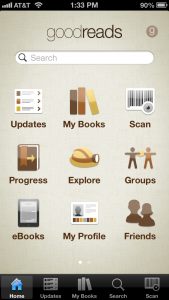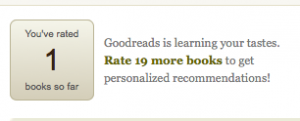Goodreads: share what you’re reading.
In his article ‘The abuses of literacy: Amazon Kindle and it’s right to read’ Ted Striphas talks about the e-reader gadget Kindle, one of the many devices that allows readers all over the world (in Kindle’s case, Amazon customers) to buy and read books online instead of a buying a printed and bounded book. Striphas’ concern is, in short, that developments like these could lead to abuse of reading and literature in general. If you purchase an e-book or read online, companies like Amazon save information about your reading behaviour [1], so that they can make you a new offer in the future. Once people are aware that their reading behaviour is no longer private, it’s possible that they start reading different kind of books or even stop reading. If readers no longer feel that reading is a private process that they do for themselves and start behaving differently towards it, their ‘right to read’ is violated [2].
As someone who never purchased an e-book or reads online, I wasn’t aware of this privacy matter and possible consequences until I download the app ‘Goodreads’ on my iPhone, developed as an extra service by the popular review website Goodreads.com. The app is free and not only allows you to read lots of books on your mobile phone (or iPad) but also encourages to review the literature and share your reading process with your Facebook friends. If these friends download the app as well, you’re able to share which book you’re currently reading and how many days it took you to complete it. Goodreads creates you’re reading profile by using information from your Facebook account once you logged in on Facebook. The app also creates must-read lists for you, based on your interests and the kind of books you like to read. Once your profile is completed, you can join online bookclubs and compete with other readers, or set a goal to read three books in a month, for example.
Goodreads anticipates on what its users like and how fast they read. Once I put ‘The picture of Dorian Gray’ on my to read list, the app immediately suggested that I read ‘The catcher in the rye’ too. The app looks up literary events in the area for you as well, once you fill in your zipcode or location. It’s very easy to use because all the books are filed under genre or by how popular they are. The website creates ‘best book the year’ list as well, so if you don’t know what to read, you can view this list for inspiration or gift ideas.
The constant upgrading of apps and development of new technology allows us to share everything that we do, and we are used to this need to share by using Facebook and Twitter, so it makes sense that a lot of people like to share what they read as well. Goodreads founder Otis Chandler even admits that the website is based on the growing use of social media, that allows us to share what we do online and that this strategy really appeals to the growing amount of Goodread-users. But even after spending only a couple of days using Goodreads, I noticed that the books I put on my must-read and have read lists are only books that look good on that list. The thought that other people could see what I am about to read made me more aware of the choice of the book. This problem does not exist when you purchase a book in a store and read it in the privacy of your house, where no one knows what you’re reading. If someone that reads a book from time to time is starting to feel like everyone is able to see which books he or she choose to read, I share Striphas’ concern that people could start acting different towards reading in general.
It’s fascinating to see what a free app like Goodreads offers their users. For a lot of the titles that the app provides you don’t have to pay, so when a title pops up you can read it while waiting for the bus or just scroll through it to see if you might like to read the whole book. For users who don’t mind that other users can see what they read, the competing aspect of the app can also encourage to read even more books. So if you like to read and you find yourself spending too much time on you smartphone instead of reading, an app like Goodreads may be the perfect solution. Just know that Goodreads is looking over your shoulder while you do.
Literature and links:
NYtimes.com: http://bits.blogs.nytimes.com/2011/03/10/need-advice-on-what-to-read-ask-the-internet/, March 2013.
[1] Striphas, Ted: ‘The Abuses of Literacy: Amazon Kindle and the Right to Read’, Communication and Critical/Cultural Studies 7.3, 2010, p. 309.
[2] Striphas, Ted: ‘The Abuses of Literacy: Amazon Kindle and the Right to Read’, Communication and Critical/Cultural Studies 7.3, 2010, p. 311.
Techcrunch.com: http://techcrunch.com/2007/12/17/goodreads-raises-angel-round-to-help-you-find-that-perfect-book/#comment-1853293, March 2013.


